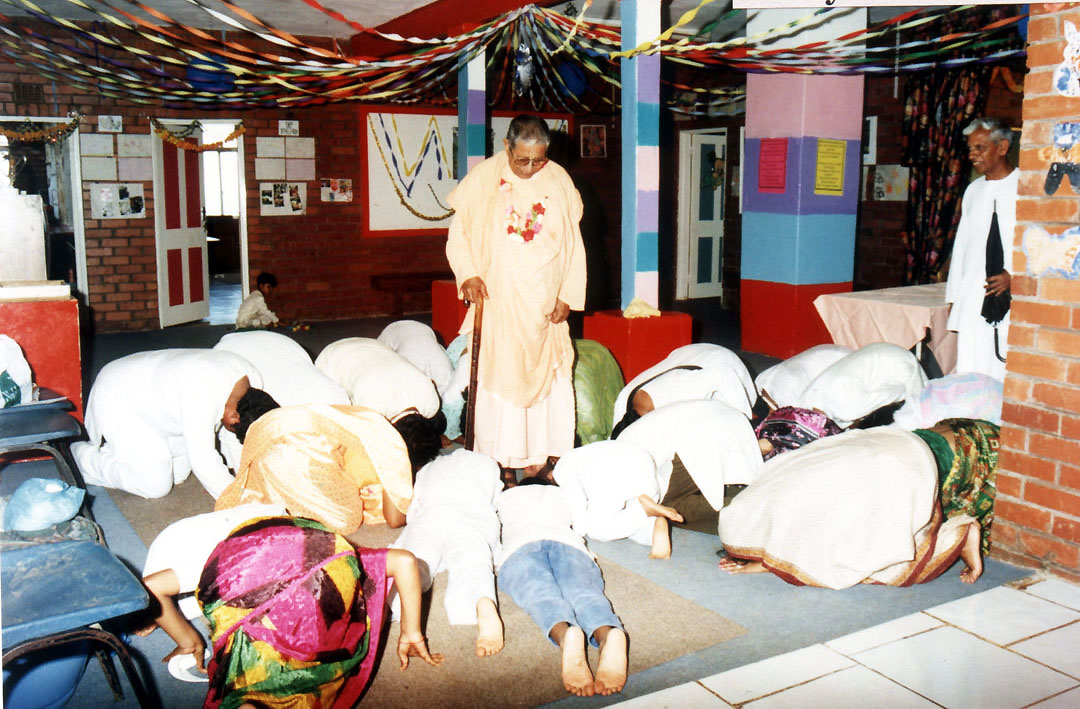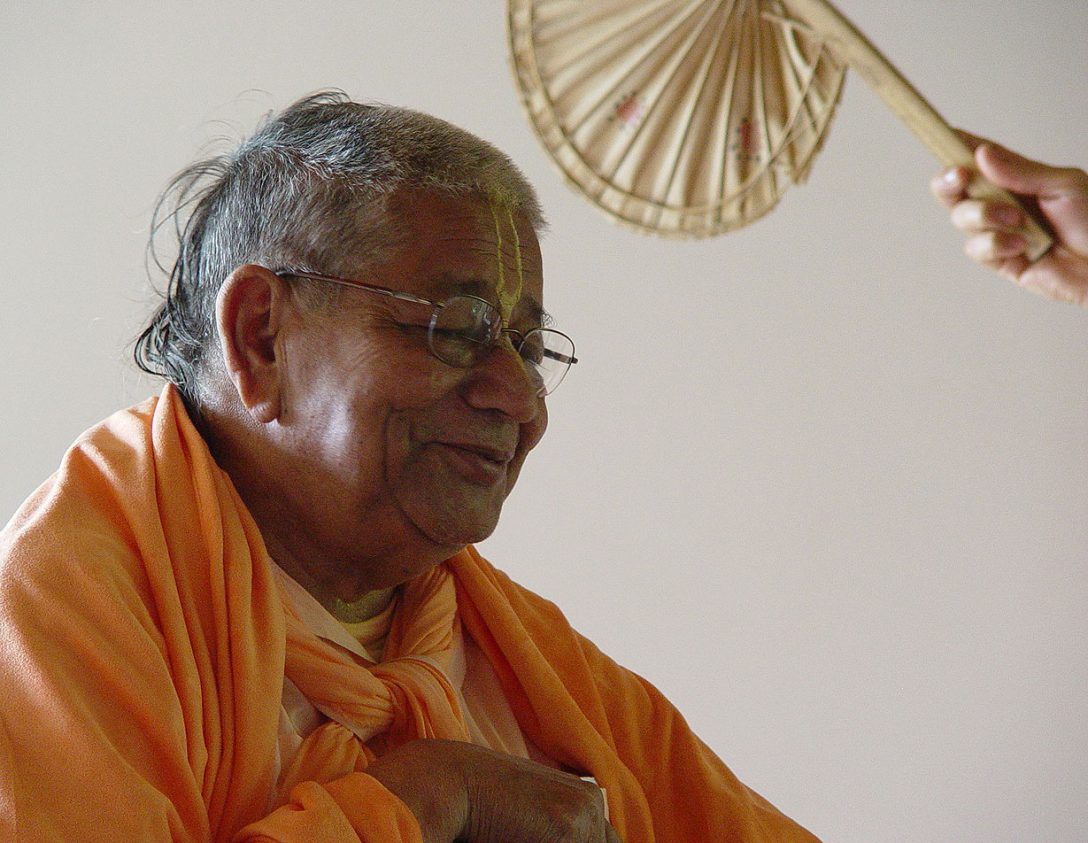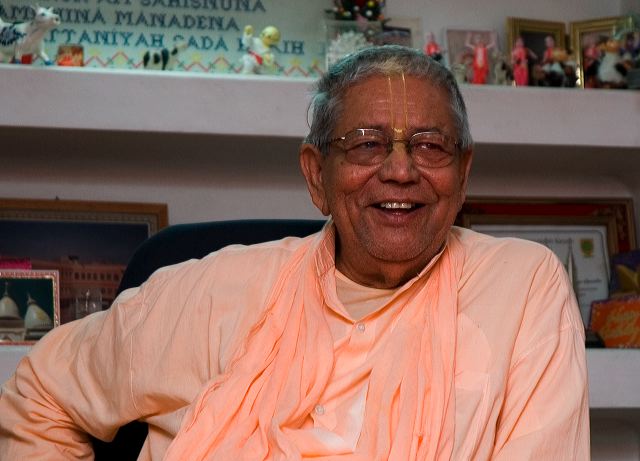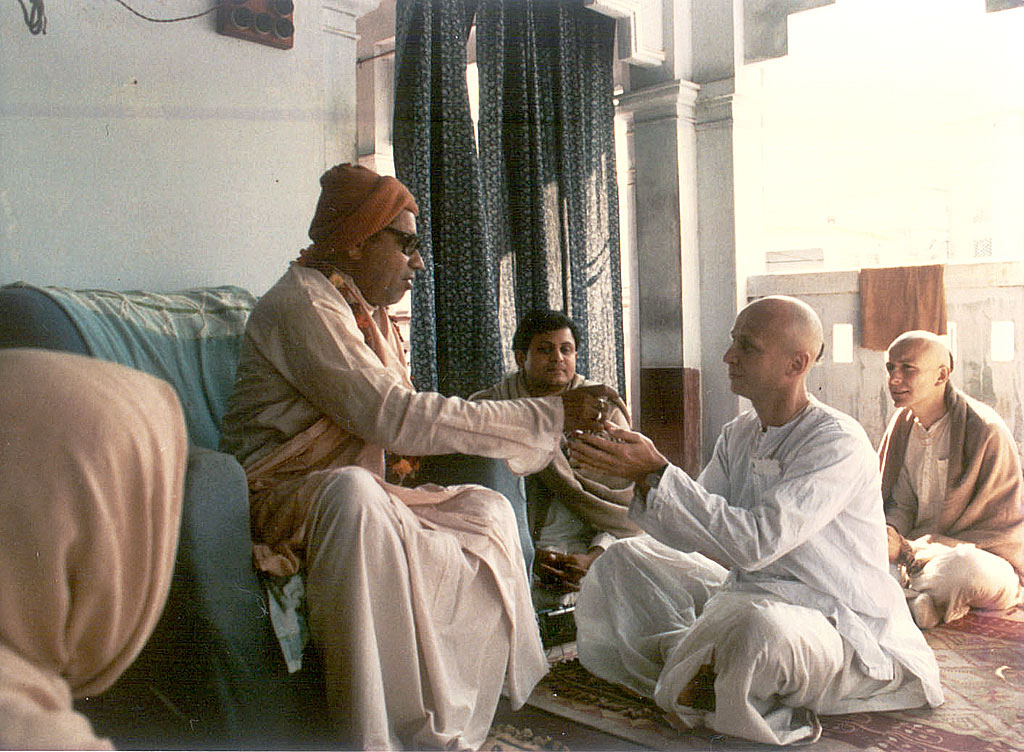Question: Everyone has some karma, and sometimes someone else’s karma is disturbing me. How can I understand when I should try to correct this other person’s karma? How can I know if it is correct or incorrect to try to modify another person’s karma? How can I understand how to act for my benefit and for the benefit of this other person?
Śrīla Govinda Mahārāj: Actually karma means action. It is the law of this material world, ‘To every action, there is an equal and opposite reaction’. This is Newton’s third law. As yet, no one has broken that law [laughter]. And there is good karma and bad karma. Good is what is giving us upliftment from the illusory environment to the transcendental plane. That is good karma. And there is some indication for that: what will be beneficial for everyone is good karma. And what is non-beneficial and what is harmful for others is called bad karma. Someone may be benefitted by that, but if it is breaking the society law, which has been made for the society’s benefit, we are considering that to be bad.
If our action, karma, will give us upliftment from the present level of the illusory environment to the transcendental plane, that will be very good karma. That is written in the scriptures. We see that there are so many religions in this material world within human society, but the target of all religions is to take us from a lower level to a higher level. And we can go up through our good karma. We see that indication within all religions. For that we are respecting all religions: all religions want our upliftment from this very lower level to a higher level. They are not only looking for their own benefit, but they are looking for the benefit of the human society, benefit of the dog society, benefit of the cow society, benefit of the plant society, even the benefit of the insect society: we can see that type of program within all religions. And we can practise that very easily if we follow this Kṛṣṇa consciousness.
If we follow Kṛṣṇa consciousness, then we can easily practise and go to a higher level. And there the process is this: humility, tolerance, and giving honour to others. This is the first conditional process. These three qualities will make the whole world our friend. My karma will be more pious, and my practising will be harmless. Otherwise, someone will kill some goat, someone will kill this, someone will do that. Sometimes it may not be harmful for me, but it will be harmful for others. I have seen that it is a law here that you cannot cut down a big tree. You cannot cut it, you must maintain it. We are practising Kṛṣṇa consciousness in this way.
Question: How can you recognise what is good and what is bad?
Śrīla Govinda Mahārāj: What is good for everyone is good, and what is bad for everyone is bad [laughter]. It is natural. But sometimes it happens here that we cannot understand that an activity’s result will be good in the future, though at present it looks bad. Then what will we do? Previously crystal sugar candy was the medicine for jaundice, hepatitis. It is written in the Ayurveda. But who has hepatitis will taste that sugar candy to be bitter, pittopatapta-rasanasya. When he first takes it, he will get a bitter taste, not a sweet taste. But finally it will give them their super benefit, and the disease will go out. Karma is also like that: we cannot always see that karma will give a sweet taste. In that case we must arrange a sugar coated pill, and then the disease will go out. For some persons the bitter is necessary, and for some persons sweet is necessary. But if the action will finally give a good result, then that karma will be good. If the final result will come good for everyone, that is good.
Pittopatapta-rasanasya: when we give them sugar candy, they will not feel that the taste is good. But finally it will cure them and they will taste the sweetness. But what is good for everyone and good for others is good karma. The colour may be a little different, and everyone will not feel it is tasteful. Everyone may not feel it is good, but for the patient it is necessary to give that type of karma to him, “Do this, do that.” It is not necessary for them to fully to understand, but according to their capacity they will take it.
Question: Does this mean that however it is coming we have to accept this medicine?
Śrīla Govinda Mahārāj: Yes, but the medicine must really be medicine and it will come from a doctor. Then that will be beneficial.
Question: Will the medicine have effect in a short time or long time?
Śrīla Govinda Mahārāj: It is depending upon the person, and depending upon the situation of the disease, and how much we are attached.
Spoken by Srila Gurudev during his visit to Italy in September 2000
Reference
syāt kṛṣṇa-nāma-charitādi-sitāpy avidyā-
pittopatapta-rasanasya na rochikā nu
kintv ādarād anudinaṁ khalu saiva juṣṭā
svādvī kramād bhavati tad-gada-mūla-hantrī
(Śrī Upadeśāmṛta, verse 7)
“The holy name, character, pastimes and activities of Kṛṣṇa are all transcendentally sweet like sugar candy. Although the tongue of one afflicted by the jaundice of avidyā [ignorance] cannot taste anything sweet, it is wonderful that simply by carefully chanting these sweet names every day, a natural relish awakens within his tongue, and his disease is gradually destroyed at the root.”
Tag: respect
Young blood, old blood
Wait and see. You are not getting any solution? Wait and see. Do not react immediately. If it is not palatable, then do not even say the truth. But do not tell a lie.
There are many things that we may not understand in our young age, but when we get experience and old age, then many things will become clear in front of us. Time can give us some consciousness. That is my experience.
Simply, Srila Guru Maharaj said, “Wait and see. You are not getting any solution? Wait and see. Do not react immediately. If it is not palatable, then do not even say the truth. But do not tell a lie.”
satyam brūyāt priyam brūyāt ma brūyāt satyam apriyam
(Manu-samhita: 4.138)
This is Guru Maharaj’s advice. You must tell the truth, and palatable truth. What is not palatable, do not tell that. This type of realisation will also come through experience and age. Young blood cannot tolerate, but old blood can tolerate so many things. Then, what is necessary is to connect with some fuse, and then the whole line will be activated. It is existing within the hand of Krishna, and He has given that to His representatives. Try to get it in the proper channel, and not in any ‘massacre’ way, but with humility, with tolerance, and giving honour to others. Everyone will be your friend and well wisher. This is the advice of Śrīman Mahāprabhu, Śrīla Guru Mahārāj, our Param Guru Mahārāj, and also Prabhupād A. C. Bhaktivedānta Swāmī.
Srila Gurudev speaking in Italy, September 2000, during His Divine Grace’s sixteenth world tour.
The real prescription
They want to know how many hands Mahavishnu has, they want to know how many legs Nrsimhadev has, they want to know how Nrsimhadev is eating. They are reading so many big, big things somewhere, and someone is hearing, “Prabhupad said this, Prabhupad said that”; someone is telling, “This scripture said this, this scripture said that”—but nothing will come for my spiritual benefit!
The following response came in a very particular way: after patiently responding to repeated technical questions regarding the tatastha-sakti and the nature of the jiva’s fall to the material world, His Divine Grace suddenly segued into a discussion about the difficulty some devotees face with drugs and habits of intoxication, and how they can best overcome this. When a listener then asked Srila Gurudev for further advice on this point, Srila Gurudev responded with a strong reprimand on the knowledge-seeking attempt in devotional life—clearly speaking not to the immediate question at hand (which had really already been answered), but rather to the previous persons who had persisted in pressing His Divine Grace for details on the nature of the jiva’s fall.
Download mp3 audio
Question: We are living in this Western society and more or less we are all like victims, prone to fall prey of the material environment. What is the remedy? We need some forceful advice, some stronger medicine, to help us become free of this.
Srila Gurudev: It is difficult to give forceful advice. I can give that stronger medicine. I know that medicine, but I cannot give that. That is not only your question, it is my question to myself. I need to do good for my friends. Who is taking initiation from me is my disciple and I have responsibility for my disciples. I must try to give relief my disciples first. That is my duty.
The remedy is a very simple remedy, given by Srimad Bhagavat, and I can say it to whoever is under control of me. If he or she will follow me blindly then they will get the remedy. It is very simple. Krishna gave that method to the devotees, and Mahaprabhu Himself happily accepted that remedy. But if I shall say it [publicly] in the meeting no one will learn happily. No one will learn my teachings. My disciples will learn, because I am with them from the beginning; but I also have some general responsibility for others, and their prescription must be another prescription. But actually, the real prescription is what was given by Srimad Bhagavat, what was given by Mahaprabhu. That is the real prescription, but who will learn it, who will hear it, and who will follow it?
They want to know how many hands Mahavishnu has, they want to know how many legs Nrsimhadev has, they want to know how Nrsimhadev is eating. They are reading so many big, big things somewhere, and someone is hearing, “Prabhupad said this, Prabhupad said that”; someone is telling, “This scripture said this, this scripture said that”—but nothing will come for my spiritual benefit! We are publishing so many big, big books, showing our knowledge, “I am doing this, I am doing that”, but I am not taking any instruction from my instructor or any instruction from my friend.
I am living in the ‘higher plane’, that is the egoist temple. But it is first necessary to blast that egoist plane.
jñāne prayāsam udapāsya namanta eva jīvanti
This sloka is the remedy. Mahaprabhu gave this, and Mahaprabhu accepted this.
sarva-dharmān parityajya mām ekaṁ śaranaṁ vraja
Even this verse Mahaprabhu did not happily accept. If you read Ramananda Ray and Mahaprabhu’s conversation you will see.
It is not necessary to know everything. It is not necessary to make any confusion with any hazy matter. No benefit will come to us through that. Benefit will come if we are surrendered to the Lord, and not only surrendered,
jñāne prayāsam udapāsya namanta eva
jīvanti san-mukharitāṁ bhavadīya-vārtām
Mahaprabhu said, “Yes, this is some remedy.” We may have so much knowledge about Bhagavad-gita, about Bhagavat, about Veda, Vedanta, Upanisad, but what is the use of that?
Once a friend of my friend, a magistrate in Puri, was abusing our sampradaya, saying, “If someone has not read Govinda-bhasyam how can he be considered a sannyasi of the sampradaya?” I was very disturbed. In my house he was abusing the Vaishnava sannyasis and I could not tolerate it. I came out from my room and told him, “Oh ‘Mr eligible person’, I read Govinda-bhasyam and how many hands do you see on me? How much hands have you seen on me? You read Govinda-bhasyam, and how many hands have you got? How many hands does your guru, who taught you Govinda-bhasyam, have? Has everyone got chatur-bhuj [a four-handed form]? How much progress have you made after reading Govinda-bhasya? You are a lawyer, you are dealing with material law, and illegally or legally you are doing that. How many hands have you got, that you can abuse the Vaishnavas?”
The fact is this: we may know everything of the scriptures but if we do not know how to swim we will drown in the river. That is the fact in front of us. I am initiating some persons: I want to give them the process through which they can gain liberation from this material world and join in the transcendental world. I am giving them the seeds of what I have heard and what I have received, along with my wellwishes, my blessings, and everything, and they will be promoted with that.
It is necessary to follow a real practising life, and that will come through tṛṇād api sunīchena [being more humble than a blade of grass], taror iva sahiṣṇunā [being tolerant like a tree], amāninā [not expecting respect], mānadena [giving respect]. How much are we following that? We need to preach this to them first. Leave your egoistic tendency.
jñāne prayāsam udapāsya namanta eva jīvanti
Mahaprabhu said it. Srimad Bhagavat said it.
If we want a real practising life it is not necessary to read so many things. It is not necessary to know so many matters. Only how to swim, that is necessary to know! I want to cross the river. But we want to know, “Why is the sun coming out on the east side, and why is it setting on the west side, and why is the air flowing all over the world, why is this star giving that result, and why is that star giving that.” We are trying to collect so much knowledge but we are not trying to collect how to swim.
It is my advice to my friends who are depending upon me, “Be serious for your practising life.” It is not necessary to read so many things. I told you, those three books are sufficient: Srimad Bhagavad-gita, Brahma samhita, and Chaitanya-charitamrta. If someone is a preacher, then under guidance of his Guru, if necessary, he will try to preach something. But always with these three qualities of humility, tolerance, and giving honour to others. Otherwise, the result will not come to us.
Srila Gurudev speaking in Italy, August 1999, during the Fourteenth World Tour.
Reference
jñāne prayāsam udapāsya namanta eva
jīvanti san-mukharitāṁ bhavadīya-vārtām
sthāne sthitāḥ śruti-gatāṁ tanu-vāṅ-manobhir
ye prāyaśo ’jita jito ’py asi tais tri-lokyām
(Srimad Bhagavatam: 10.14.3)
“In whatever position they may be, those who give up the endeavour for knowledge, surrender to the sadhus, and dedicate their lives bodily, verbally, and mentally to their talks of the Lord, can conquer the Lord, who is otherwise unconquerable.”
Spoken by Srila Gurudev in Italy, August 1999, during His Divine Grace’s fourteenth world tour.
Cleaning the mirror of the heart
Every moment will be joyful in your life. Dedication to the Lord and chanting the Holy Name, the nondifferent form of the Lord, can give us all auspiciousness.
Question: I would really like to hear about Sri Chaitanya Mahaprabhu, and how we can serve him.
Srila Gurudev: Mahaprabhu first indicated to beginners that you will get all the benefit of your spiritual life if you can chant the mahamantra properly. Your mind is like a mirror covered with dust, and through chanting that dust will be removed and you will see your true form. The suffering that we experience from so many things in this material world will also reduce and finally go out.
cheto-darpaṇa-mārjanaṁ bhava-mahā-dāvāgni-nirvāpaṇaṁ
śreyaḥ-kairava-chandrikā-vitaraṇaṁ
Through your chanting feelings of God will reveal in your heart, you will see your beautiful divine form, and your mood of service will give such happy light in your spiritual environment. You will get very close association with your Lord, like the feelings between a husband and wife.
cheto-darpaṇa-mārjanaṁ bhava-mahā-dāvāgni-nirvāpaṇaṁ
śreyaḥ-kairava-chandrikā-vitaraṇaṁ vidyā-vadhū-jīvanam
ānandāmbudhi-vardhanaṁ
When that divine form of the Lord as Harinam reveals within your heart then automatically joy will come, and every moment when you are chanting the Holy Name, the feeling of God’s association will come to you.
prati-padaṁ pūrṇāmṛtāsvādanaṁ
Every moment will be joyful in your life. Dedication to the Lord and chanting the Holy Name, the nondifferent form of the Lord, can give us all auspiciousness.
Sri Chaitanya Mahaprabhu advised the conditioned souls in this way.
prabhu kahe—kahilāṅ ei mahāmantra
Of all mantras this is the best mantram in this age of Kali-yuga. Other practising processes will not be so fruitful. Meditation, chanting, and congregational chanting of this mantram, and service to this mantram, will give all good results to us.
Then if we want to satisfy Sri Chaitanya Mahaprabhu we will first try to chant the Hare Krishna mahamantra, and if we can do that continuously that is very good.
Be humble, be tolerant and give honour to others
Mahaprabhu gave eight verses as advice for the conditioned souls, and in the third verse He explained how attachment, love, and affection will grow for chanting the Holy Name. He gave this advice: if you can be humble, be tolerant, and give honour to others then you will be worry-free from your circumstances.
You can believe and you can live within the faithful plane. Faith is necessary. That is the first basis of this conception. Not only in the line of Krishna consciousness, but the first advice of all religious conceptions is, “Be faithful”. At first, beginners may not be able to maintain their faith because they are not seeing anything and not getting anything in their hand. They do not have practical knowledge and experience. For that reason strong faith will not come immediately. But through realisation, through association, through hearing, through reading, faith will become more and more strong. In different ways our faith will grow more and more, but the scriptures say that association is the best. If good association is not available then we can practise through reading the books, chanting the Holy Name, hearing from an expert, and so on.
We must try to realise our previous activity, our present spiritual situation, and our future prospect. It is necessary to take advantage of the value of the present time.
Sri Chaitanya Mahaprabhu will be happy if we follow His directive to chant the mahamantra without offence. The mahamantra Himself is Radha and Krishna. Both Their Names are present within this mantra with a calling mood. Even within some processes in this material world we can see that sound can take form: now when you are talking to someone by telephone it is also possible to see their form, their mood, and so on. So, if we can chant properly They will reveal in our heart. We cannot say that it will happen immediately but anyone can get it, and if someone is sincere with their practice they will get some feelings from the beginning.
When Mahaprabhu said that there is no alternative other than chanting the Holy Name of the Lord, then it is not necessary to go left or right or anywhere else. Be steady, be faithful, and try, and success must come to you.
We are trying but not properly trying, because we are always mixing with material things, and it is natural. If we can chant without offence then proper purification will come and we must be benefitted through that. Time is a factor: it is in front of me and must give me some disturbance. But if we can see the eternal time that is nothing by comparison.
When Mahaprabhu said that there is no alternative other than chanting the Holy Name of the Lord, then it is not necessary to go left or right or anywhere else. Be steady, be faithful, and try, and success must come to you. And because “Hare Krishna” is Radha–Krishna then if They reveal in your heart you will automatically join with the Pastimes of Krishna-lila. That is the gift of Sri Chaitanya Mahaprabhu: Krishna-prema, love for Krishna, affection for Krishna, and service for Krishna. When it will reveal in your heart then Krishna will also reveal with that mood.
In this way, many things in many places have given us the clue of practising life. But at first beginners must try with faith.
Srila Gurudev speaking in Italy, September 2000, during his Sixteenth World Tour.
Reference
The mahamantra:
hare kṛṣṇa hare kṛṣṇa kṛṣṇa kṛṣṇa hare hare
hare rāma hare rāma rāma rāma hare hare
Related reading
Discussion of Sri Chaitanya Mahaprabhu’s Siksastakam verses in Revealed Truth
Article on the mahamantra
The humility of Srila Jiva Goswami
We must always be humble. Maya will give many tests but we must try to tolerate everything and realise why such things are happening. Furthermore, if we want to remain peacefully we must give honour to others. If we do not disturb others but give honour to them, they will not disturb us. They will think, “This person is very innocent. He is not against me, furthermore he nourishes me by giving me respect, so I must not disturb him.”
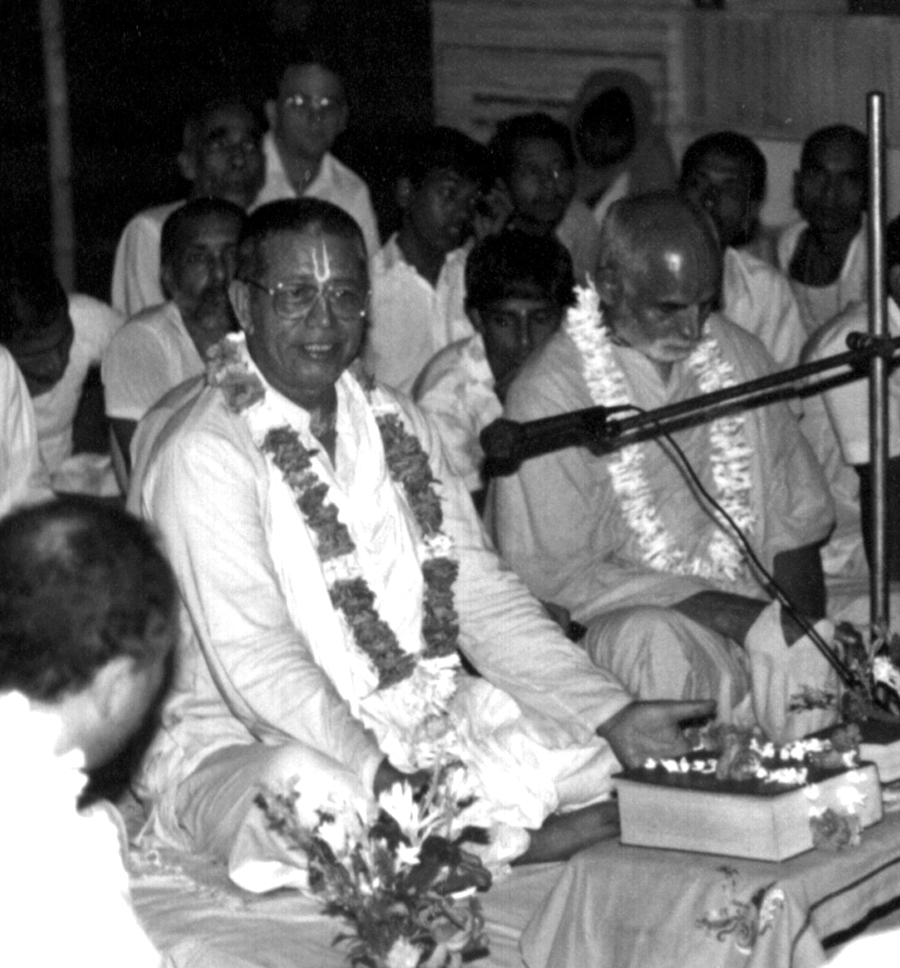
Mahaprabhu always wants that His devotees have peace in order to practise spiritual life. Such peace is only possible if the devotees are humble and tolerant, and if they give honour to others. The devotee will think, “I do not want to see whether someone is an honourable person or not, but I know my own position is that of an insignificant soul who is aspiring to be a servant of the servants of the servants of Krishna. So if someone wants any honour from me I must immediately give it to him and not give him any chance to think me to be an enemy.”
We can see an example in the Pastimes of Srila Rupa Goswami who was approached by a digvijaya pandit, a big world-renowned scholar. Hearing of Rupa Goswami’s name and fame he went to him and challenged: “If you cannot defeat me then give me your certificate by signing a statement that you have been defeated by me.”
Rupa Goswami thought, “I have no time to talk with that man.” He therefore asked, “Where is your paper? I shall sign it.” He then wrote to the effect that, “This man is a great pandit and I have been defeated by him,” and he signed it. This is the nature of the pure devotees, they do not want to cause disturbance or trouble to others. They are well aware that everything here is a passing show. People think that what they have is their wealth, but we neither know when we shall die nor where we shall go after death. Our duty is to prepare ourselves for the service of Krishna, and *that* is the real wealth of our lives. Our only shelter is to serve Krishna, therefore we do not want to waste our time with worldly affairs.
This is one mood of the devotees, and another is shown by Jiva Goswami Prabhu. He wanted to rectify that digvijay pandit, and therefore chastised him: “You went to see Rupa Goswami but you do not know who he is. You think yourself to be a great pandit, but now I consider you to be very foolish. You went to the ocean of ecstasy but you did not receive even one drop of that ecstasy. You went there but came back empty handed, therefore I consider you to be very foolish. You do not know who Rupa Goswami and Sanatan Goswami really are, therefore you went to defeat them. You have made a great offence to them. I am their disciple and if you want to examine me then go ahead, by which you may understand something of their greatness.” Anyhow, that digvijay pandit received the mercy of Jiva Goswami and was defeated by him within a few minutes. He could understand he had made much offence to Rupa and Sanatan, and, by Jiva Goswami’s mercy, he left his ego. The pandit immediately returned to Rupa Goswami and Sanatan Goswami and, apologising, took shelter of them. Jiva Goswami was happy that he was able to do some service to his Guru by rescuing this digvijay pandit from illusion.
Following this incident, Rupa Goswami, in order to teach us, showed some unhappiness towards Jiva Goswami: “You have come here to Vrndavan but now it seems through this incident that you want to acquire mundane fame.” This, however, was not the desire of Jiva Goswami, his intention was to glorify his Guru, correct the digvijay pandit, and bestow mercy upon him. This lesson is from one of the many incidents in the lives of our Acharyas.
Excerpt from Dignity of the Divine Servitor, compiled from the talks of Srila Gurudev.

